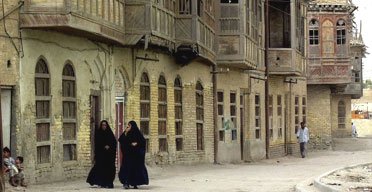|
Basra is the second largest city in Iraq (next to Baghdad). Its Jewish settlement dates back over a thousand years. Nearly two hundred years ago, before the great exodus of Jews from Iraq, a miraculous salvation came to the Jews of that city, which led to the establishment of a special Purim to commemorate the event. 
This miracle happened in the days of Suleiman Pasha, who governed Basra with justice and righteousness and treated the Jews kindly. Under the guidance of their leader, Rabbi Jacob ben Aaron, the Jewish community flourished. That is, until one day in Nissan, in the year 5534 (1774). On that day, Karim Khan, the Vizier of the Shah of Persia, arrived with a great army and besieged the city. Suleiman Pasha fought against Karim Khan, but could not prevail over him. A great famine spread in Basra and the city could no longer be defended. On the 27th day of Nissan the city fell into the hands of the invaders. The conquering soldiers robbed and pillaged the city, and many Jewish women threw themselves into the raging fires to escape the clutches of the barbarous hordes.
On the first day of the month of Iyar, Karim Khan established his rule over Basra. He imposed heavy fines on the people, particularly on the Jewish community, taking their leaders as hostages. Rabbi Jacob ben Aaron, with his wife and children, were sent as prisoners to the Shah in Shiraz, along with Suleiman and his family. And while Karim Khan and his men sat down to drink, the city of Basra was in despair.
Then, the Jews of Basra gathered in their synagogue, proclaiming a fast of repentance, and crying and weeping to G-d to save them from the hands of the wicked Karim Khan and his men. And G-d heard their cries.
The hearts of kings and rulers are in G-d's hands, Jewish teachings explain. G-d strengthened the heart of Karim Khan to seek more conquests and glory. Karim Khan went out to fight against the neighboring Arab tribesmen, but his army suffered defeat and retreated to Basra with great losses. Karim Kahn gathered a new army and went out to fight the Arabs again. But the Arabs ambushed them among the floods of the rivers and slaughtered them in great numbers. Karim Khan barely escaped with his life and returned to Basra with the beaten remnants of his army. The Persian Vizier lost no time in trying to gather a new army to fight against the Arabs. But his battle-weary soldiers had no heart to fight any more and they plotted to kill Karim Khan. On the 27th day of Adar, thirteen days after the original Purim, the wicked Persian Vizier was found dead, poisoned by the hand of his own servants.
News of the death of his Vizier and of the defeat of his armies reached the Shah. He ordered the remnants of his army to leave Basra under the cover of darkness and return to Persia in secret.
On the second day of Nissan, in the year 5535 (1775), the Jews of Basra rose up in the morning and discovered that not one of Karim Khans men remained in the city. Great was the rejoicing of the Jews of Basra at this miraculous deliverance from the hands of so wicked an enemy. They gathered in their synagogue to offer thanks to G-d for the miracle, and resolved to observe that day, year after year, as the day of the miracle.
It so happened that a saintly rabbi and kabbalist from the Holy Land was visiting Basra at that time. He had been sent as a special messenger by the Jewish community of Hebron to obtain financial support for the poor and needy of that ancient city. His name was Rabbi Jacob Elyashar (he was the grandfather of the Chief Rabbi of Jerusalem, Rabbi Jacob Saul Elyashar). Rabbi Jacob Elyashar composed a special scroll for the Jews of Basra, to be recited by them in the synagogue on this "Day of the Miracles," and to be followed by a special feast, with gifts to the poor, as on the day of Purim.
The Jews of Basra willingly accepted all his suggestions and incorporated them into the by-laws of the community, and ever since they observed the 2nd day of Nissan as a special Purim, "The Purim of Basra."
|

